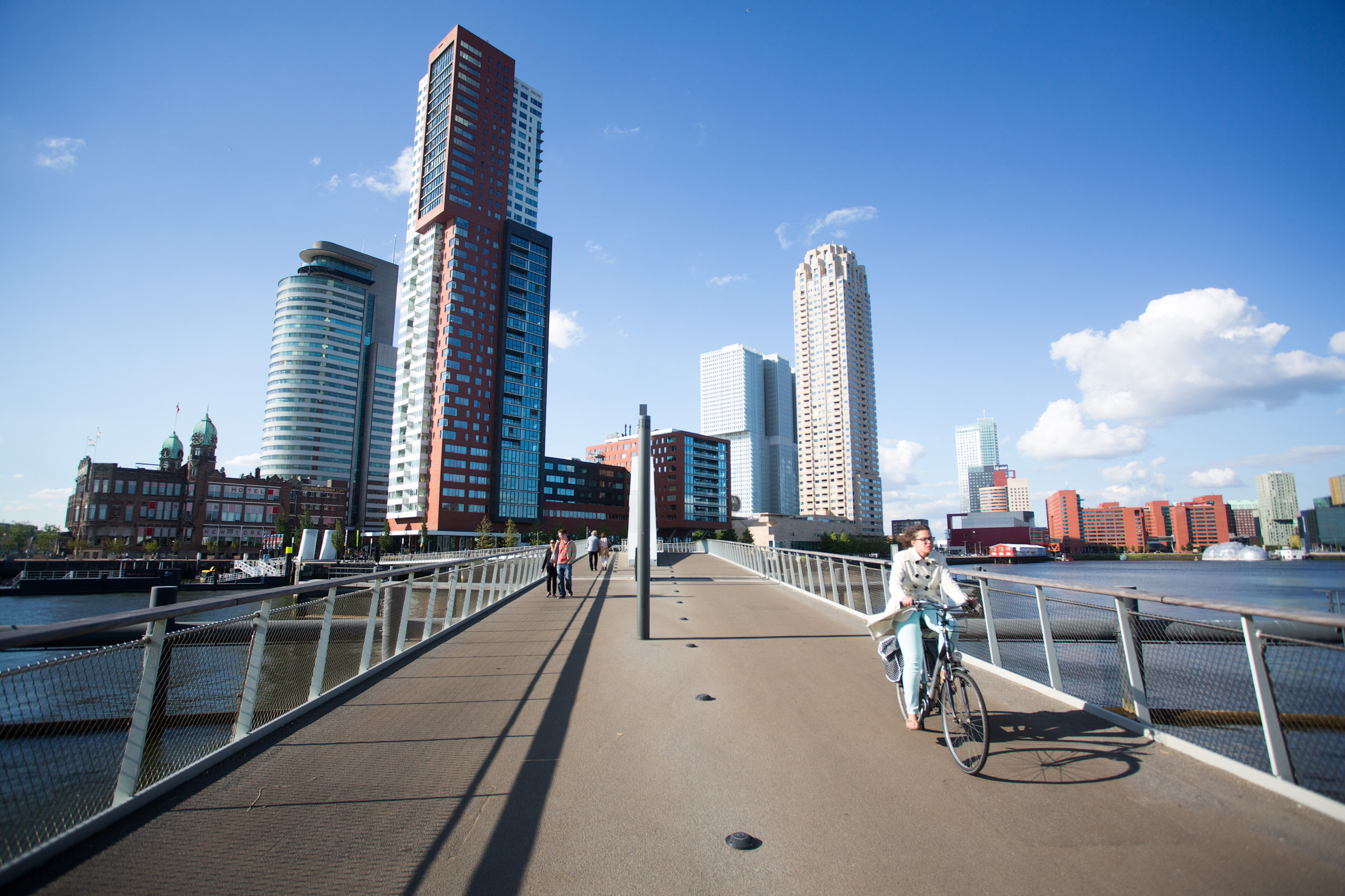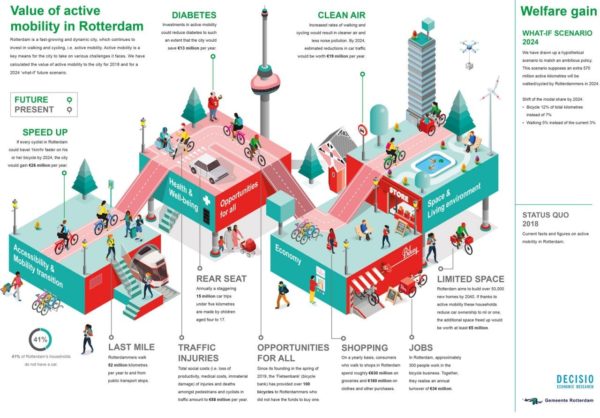How to Get Cycling on the Agenda? Bikenomics!
13 August 2021
- Bikenomics, rotterdam
Bikenomics as a Tool for Reshaping the Problem of Urban Mobility
When you are on a bike, you know cycling is benefiting you: you are burning calories, saving gas and insurance money; you are not emitting pollutants which you might inhale back. Stroke after stroke of the pedal, you reflect on how good cycling is for those who cycle, and you would like to have the opportunity to cycle more, and that other people would have that opportunity too. To get there, safe infrastructure, direct and accommodating streets, and maybe some initial incentives are necessary, but you might have a hard time convincing decision-makers to invest in cycling. After all, they usually respond, only 2-3% of people in your town/region/nation are cycling, so investing money for them is benefiting a minority; motorists are the majority, and money gets spent on them.
How can you make a good case for cycling as a viable means of transportation? How to get cycling on the transport agenda? At Decisio, we found one answer that works well: redefining who are you doing it for. By looking at cycling in broader terms. We know cycling is good for those who do it. But is cycling good also for everyone else – even for those who do not cycle?
Is Cycling Good for the Whole Society?
The best way to answer this question is through Bikenomics, which is a (now) widespread term that indicates economic thinking applied to cycling. Bikenomics studies how the activity of cycling influences society through its impacts.
Remember the sweat on your shirt when you arrive at the office? That sweat might be unpleasant as it runs down your back, but it is actually beneficial for society, since more physical activity decreases your risk of getting sick, and thus the burden on the healthcare system—not exactly an inconsequential effect these days. Not only that, physical activity increases your work productivity and life expectancy. On top of that, the fumes you did not emit are an avoided burden for society too, as they did not contribute to the damages of local pollution and climate change. The congestion you are not contributing to is also collectively beneficial, as everyone is a tad faster to get to their destination since you’re out of the way.
All of these factors, and many more, contribute to the impacts cycling has on society, and the same is true for any form of mobility. At Decisio, we study these impacts in great detail and we compare them with the impacts and the costs associated with other forms of transport that people might use as alternatives. Through our collaboration, public administrations all over the world have cleared their mind about the best way to invest their resources when it comes to transport in order to maximize the collective welfare.
In most of our analysis and models, cycling-related options scored very high: cycling is among the means of transport which make the most economic sense for society, since it allows for optimal use of resources which are scarcer and scarcer, such as public space and private time. The power of bikenomics is that it does not offer a unique solution to the problem of urban mobility—in fact, most of our analysis advocates for a mix of mobility solutions which are not limited to cycling; instead, bikenomics helps decision-makers reflect about urban mobility in a different way, reframing their problems from things like “How do I accommodate all these cars in narrow spaces?” to “How do I ensure our mobility system helps our society thrive?”. Instead of putting cycling on the transport agenda, bikenomics suggests a different agenda must be used altogether.
Cycling and Walking in Rotterdam Represents Millions of Euros
Cycling and walking bring about positive and future-proof changes. Active mobility makes an essential contribution to the challenges of keeping cities attractive and accessible. But it also gives a positive impulse to challenges such as sustainability, clean air, health; opportunities for everyone and the economy. Everyone understands this emotionally. But what if we get the numbers right and show what kind of values we are talking about?
Rotterdam has about 650.000 inhabitants and is the second largest city in the Netherlands. This modern city is expected to continue to grow strongly in the coming years. Rotterdam’s growth challenges policymakers to come up with smart solutions for mobility. Imagine a future scenario in which the share of cycling kilometres in the modal split rises from 7 to 12 percent and the share of kilometres on foot rises from 3 to 5 percent in 2024. Ambitious? Yes, but not unrealistic and certainly not impossible if we look at the development of bicycle use in recent years and the mobility policies being pursued. In this scenario the additional cycling and walking kilometres represent an annual value of €19 million in emissions and environmental impacts, based on key figures per kilometre. If all cyclists could also cycle 1 kilometre per hour faster, e.g. because they have to wait less often at intersections, this could be valued at almost €27 million per year.
The health gains from more active mobility are perhaps the greatest of all. In this scenario alone the benefits of fewer diabetes patients are €13 million per year. And what about the use of space? If in the future scenario all households of the 50,000 to be built in Rotterdam could be built without a second car, this alone would yield more than €5 million per year because of the saving of space. The number that gets us thinking the most: every year more than 15 million short distance car trips (less than 5 kilometres) in Rotterdam are made with children between 4 and 17 years old in the rear seat. We haven’t calculated what the effect would be on the health of these children if they would cycle or walk these trips. But it can’t help but be overwhelming. Hopefully the future scenario will become reality!
The figures mentioned above show that cycling will have significant benefits. Not only for accessibility and the environment. After all, health, welfare, and the economy also benefit. Getting the numbers right helps policy makers all over the world in the case for investing in cycling.
This blog is based on the study “The value of active mobility” that Decisio carried out together with Soigneur in 2019 on behalf of the Municipality of Rotterdam.
Blog originally posted on the Dutch Cycling Embassy website.

